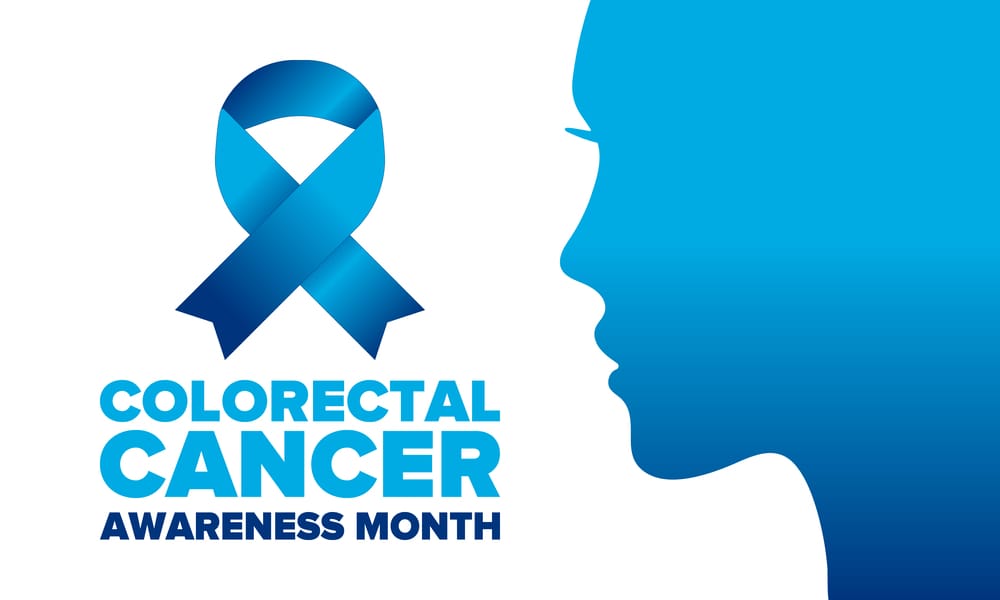By James McCormick, DO, FACS, FASCRS
March is Colorectal Cancer Awareness Month – and it’s important for adults both young and old to be aware of this “Preventable, Treatable and Beatable” disease. A National Cancer Institute study found that the rate of colorectal cancer in adults under 50 has more than doubled since the 1990s. It is the leading cause of cancer death for males age 25-49, and the third-leading cause of cancer death for females in that age group. African-Americans are at an even greater risk.
Prevention and Risk Factors
We don’t completely understand why someone develops colon cancer. But we do know there are certain risk factors that are more common in people with the disease. If you have family members who have been diagnosed with colorectal cancer, you may be at increased risk. But there are also you risks factors you may be able to modify.
Obesity, and a lack of physical activity, are connected with increased risk of colorectal cancer. Maintaining a healthy weight through diet and exercise can lower your risk of colon cancer! A healthy diet has plenty of fresh fruits and vegetables and lean protein sources, while limiting sweets, red meats and processed foods.
Smoking is a risk factor not only for lung cancer but also for colon cancer and many other cancers. Quitting smoking, or never starting to smoke, is one of the best things you can do for your health.
Never Ignore Symptoms
It’s also important for adults of all ages to be aware of the symptoms of colorectal cancer. They include chronic diarrhea, constipation or narrow stools, a constant feeling of needing to have a bowel movement, rectal bleeding, dark brown or black stool (indicating the presence of blood), abdominal pain, fatigue and unintentional weight loss.
Don’t be afraid to have symptoms checked out. Treatments are available for cancers at all stages, and the earlier we can treat them, the better.
Colonoscopies – the gold standard for colon cancer prevention
Colonoscopies save lives! The best way to detect and prevent colon cancer is through colonoscopy. Colon cancer doesn’t start suddenly – it typically starts as a small polyp in the colon. With a colonoscopy the doctor can find these polyps when they are still very small and remove them before they turn into cancer. We recommend everyone at average risk begin having colonoscopies at age 45.
For colonoscopy, after cleansing your bowel, you are placed under twilight anesthesia while the doctor uses a tiny camera on a flexible tube to examine the colon walls. You won’t be awake or feel discomfort. You’ll be back home within an hour or so. If normal, you don’t have think about it again for 10 years!
Think about it: by taking just one day out of your schedule, you can prevent colon cancer. That’s why we never stop talking about colonoscopies.
Not all-in for a colonoscopy? That’s OK. There are other options for at home-testing, such as a FIT test or Cologuard, available for people of average risk. It’s important to remember, though, that these test are only effective if followed by a colonoscopy when a positive result occurs. The major downside to home tests, compared to colonoscopy, is that they must be repeated more frequently, every 1-3 years.
Talk to your primary care physician about the best option for you.
Treatment Close to Home
Allegheny Health Network offers cancer treatment at numerous locations throughout western Pennsylvania. AHN is nationally recognized for its treatment of colorectal cancer. AHN is the first health system in the Pittsburgh region to be designated a Rectal Cancer Center of Excellence by the Commission on Cancer.
AHN nurses are available at any time to discuss cancer treatment or any other medical concerns and to help schedule appointments. To access the 24/7 Nurse Line, call 412-NURSE-4U (412.687.7348.)
James McCormick, DO, FACS, FASCRS, is System Chief of the Division of Colon and Rectal Surgery, Allegheny Health Network and Medical Director of the Rectal Cancer Center of Excellence at AHN Cancer Institute
Throughout the year, our writers feature fresh, in-depth, and relevant information for our audience of 40,000+ healthcare leaders and professionals. As a healthcare business publication, we cover and cherish our relationship with the entire health care industry including administrators, nurses, physicians, physical therapists, pharmacists, and more. We cover a broad spectrum from hospitals to medical offices to outpatient services to eye surgery centers to university settings. We focus on rehabilitation, nursing homes, home care, hospice as well as men’s health, women’s heath, and pediatrics.








